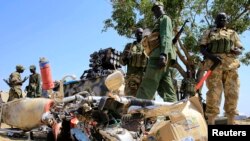JUBA —
South Sudan troops will attack the main stronghold of rebel forces loyal to former Vice President Riek Machar if the government's offer of a ceasefire is rejected, a senior minister said on Saturday.
The government offered an olive branch to the rebels on Friday, proposing a ceasefire and saying it would release eight of 11 senior politicians, widely seen to be Machar allies, arrested over an alleged coup plot against President Salva Kiir.
But Kiir's former deputy Machar reacted coolly to the truce offer, telling the BBC that any ceasefire needed to be credible and properly enforced for him to take it seriously.
“Until mechanisms for monitoring are established, when one says there is a unilateral ceasefire, there is no way that the other person would be confident that this is a commitment,” Machar said.
Information Minister Michael Makuei said government troops on Saturday morning pushed rebels out of the town of Mayom in Unity State and were ready to advance the 90 km (55 miles) to Bentiu, the last state capital held by Machar's forces.
“We will flush (Machar) out of Bentiu if he doesn't accept the cessation of hostilities,” Makuei told Reuters by phone from the capital Juba.
Fighting between rival groups of soldiers erupted in Juba on Dec. 15, then triggered clashes in half of South Sudan's 10 states - often along ethnic lines, between Machar's group, the Nuer, and Kiir's Dinka.
South Sudan, a nation the size of France and the world's newest state, has the third-largest reserves in Sub-Saharan Africa after Angola and Nigeria, according to BP, but remains one of the poorest countries on the continent.
At one point rebels loyal to Machar, who was sacked by Kiir in July, controlled Jonglei state capital Bor and occupied half of Malakal, the capital of the major oil producing Upper Nile state. They were pushed out of both towns this week.
Washington, other Western powers and regional governments, fearful of a civil war in a fragile region with notoriously porous borders, have tried to mediate.
Makuei said the ceasefire offer remains in place and that the government has done all it can to bring about peace talks to end the 14 day conflict in which more than 1,000 people have been killed.
“We released two (senior politicians) yesterday but he has not done anything,” Makuei said.
The government offered an olive branch to the rebels on Friday, proposing a ceasefire and saying it would release eight of 11 senior politicians, widely seen to be Machar allies, arrested over an alleged coup plot against President Salva Kiir.
But Kiir's former deputy Machar reacted coolly to the truce offer, telling the BBC that any ceasefire needed to be credible and properly enforced for him to take it seriously.
“Until mechanisms for monitoring are established, when one says there is a unilateral ceasefire, there is no way that the other person would be confident that this is a commitment,” Machar said.
Information Minister Michael Makuei said government troops on Saturday morning pushed rebels out of the town of Mayom in Unity State and were ready to advance the 90 km (55 miles) to Bentiu, the last state capital held by Machar's forces.
“We will flush (Machar) out of Bentiu if he doesn't accept the cessation of hostilities,” Makuei told Reuters by phone from the capital Juba.
Fighting between rival groups of soldiers erupted in Juba on Dec. 15, then triggered clashes in half of South Sudan's 10 states - often along ethnic lines, between Machar's group, the Nuer, and Kiir's Dinka.
South Sudan, a nation the size of France and the world's newest state, has the third-largest reserves in Sub-Saharan Africa after Angola and Nigeria, according to BP, but remains one of the poorest countries on the continent.
At one point rebels loyal to Machar, who was sacked by Kiir in July, controlled Jonglei state capital Bor and occupied half of Malakal, the capital of the major oil producing Upper Nile state. They were pushed out of both towns this week.
Washington, other Western powers and regional governments, fearful of a civil war in a fragile region with notoriously porous borders, have tried to mediate.
Makuei said the ceasefire offer remains in place and that the government has done all it can to bring about peace talks to end the 14 day conflict in which more than 1,000 people have been killed.
“We released two (senior politicians) yesterday but he has not done anything,” Makuei said.





